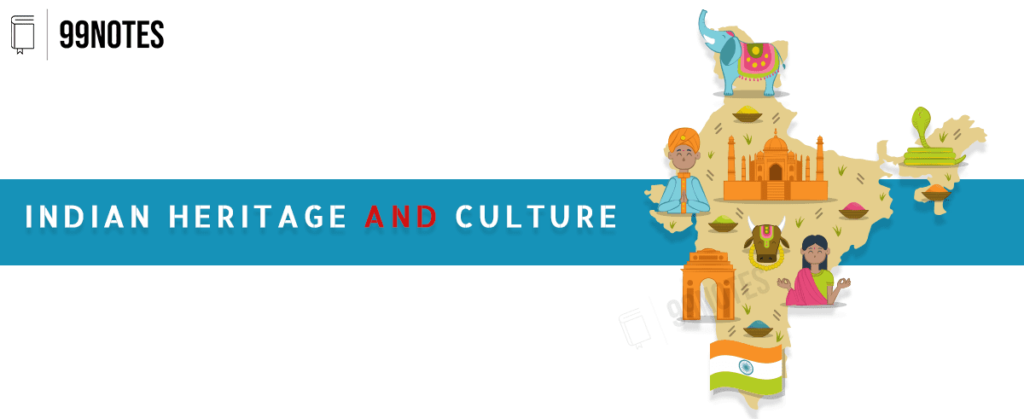
Indian Culture & Heritage UPSC Notes Free Download
INDIAN CULTURE & HERITAGE
The study of Indian culture and heritage is an important part of the UPSC Civil Services Exam, as it tests candidates’ knowledge of the diverse and rich cultural traditions of India.
Some of the key topics that candidates should be familiar with when studying Indian heritage and culture for the UPSC Civil Services Exam include:
- Ancient Indian culture: Candidates should be familiar with the major cultural achievements of ancient India, such as the Vedas, the Upanishads, and the epics of the Mahabharata and the Ramayana.
- The Indus Valley Civilization: Candidates should be familiar with the Indus Valley Civilization and its achievements in areas such as urban planning, trade, and art.
- Classical Indian culture: Candidates should be familiar with the major cultural achievements of classical India, such as the Gupta Empire, the spread of Buddhism and Jainism, and the development of classical Sanskrit literature.
- Indian folk and tribal cultures: Candidates should be familiar with the diverse folk and tribal cultures of India, including their traditions, customs, and art forms.
- Modern Indian culture: Candidates should be familiar with the major cultural trends of modern India, such as the influence of colonialism, the emergence of Indian nationalism, and the impact of globalization on Indian culture.
The study of Indian heritage and culture is important for several reasons, especially for candidates preparing for the UPSC Civil Services Exam.
Here are a few reasons why studying Indian culture and heritage is important:
- Understanding the present: India’s cultural heritage has shaped the country’s present-day culture and society in many ways. By studying Indian heritage and culture, you can gain a better understanding of the cultural traditions and values that continue to influence India today.
- Improving analytical skills: The study of Indian heritage and culture requires students to analyze and interpret a wide range of primary and secondary sources, such as historical texts, artifacts, and media reports. This can help you develop critical thinking and analytical skills that are useful in a variety of fields.
- Civil Services Exam: The UPSC Civil Services Exam is a competitive exam in India that is conducted to select candidates for various government positions, including the Indian Administrative Service (IAS), Indian Police Service (IPS), and Indian Foreign Service (IFS). Indian heritage and culture is one of the subjects that is covered in the exam, and a thorough understanding of this subject can help you score well on the exam.
- Appreciating diversity: India is a diverse and multicultural country, and its cultural heritage reflects this diversity. By studying Indian heritage and culture, you can gain a deeper appreciation of the diversity of India’s culture and the ways in which it has influenced the country’s present-day culture and society.
- Developing cultural awareness: The study of Indian heritage and culture can help you develop cultural awareness and understanding, which are valuable skills in today’s interconnected and globalized world. This can be useful in a variety of professional and personal situations, such as working with people from different cultural backgrounds or traveling to other countries.
Top of Form
Indian Heritage and Culture
In this section, we are going to discuss Architecture, sculptural Art, paintings, performing Art, Language and Literature and Indian Heritage.
Architecture: Architecture is the Art and science of building construction. Architecture is the shaping of reality according to the laws of beauty in the building of houses and structures designed to cater to man’s needs for housing and public premises.
Sculptural Art: Indian sculpture is the result of Indian Culture. The sculptural tradition came from the folk level in villages. The first instrument was the potters’ wheel, which turned the clay and created different shapes of pots and dishes. Initially, images were created in clay on a small scale, and slowly, it progressed into terracotta art.
It includes the development of Early Civilisation, Caves, Stupa, the Gupta Period, the Evolution of Dravida architecture, Vesara and other Regional styles of Deccan Indian, Fort Architecture, Indo Islamic Art, and Colonial And post-independence Architecture.
Here, we will learn in detail about Pottery, Terracotta, Bronze sculpture, Buddhist sculpture, cave sculptures, temple sculptures and coins.
Paintings: Painting as an art in India has a long heritage and history. Initially, it can be seen in rock art. It was used as a means of communicating religious principles and to narrate stories or incidents in the historical. In medieval times, painting had a significant position as an independent art.
There are different types of paintings that we can study in detail. The paintings include cave paintings, mural traditions, miniature, modern and folk paintings.
Performing art often aims to express one’s feelings and emotions in which artists use their voices, bodies, or objects to convey artistic expression. It has been well placed in the civilization and traditions of Ind=ian society.
Performing Art can be classified as dance, music, martial arts, puppetry, theatre and cinema.
Language and Literature: language is commonly considered as a means of communication. But it is also a reflection of the society it has evolved in. The languages in India are classified into different types, such as Indian languages, official languages, and six classical languages of India.
Literature showcases the panorama of the history of mankind: the social institutions, scientific achievements, religious beliefs, and philosophical ideas. The objectives are to present the journey of thoughts from the earliest times to the present.
Here, we will learn about literature, which is classified as literature in ancient, medieval, and modern times.
Indian Heritage: Indian heritage carries the meaning of culture too. Whatever we inherit from our past can be called heritage. This includes craft traditions, music, dance, painting, architecture and other art forms, traditions of production and technology, etc.
We will study religious traditions in detail, the schools of philosophy, festivals and fairs, UNESCO’s list of World Heritage sites in India, Intangible Cultural Heritage, handicrafts, and awards.

